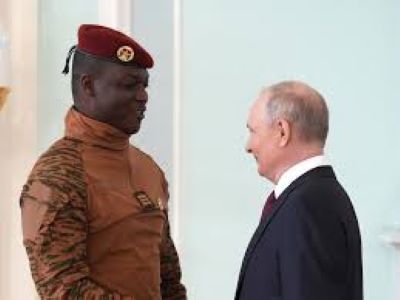Officials from Russia and Burkina Faso met in Moscow to discuss the expansion of military cooperation, underscoring Russia’s increasing efforts to assert its influence in Africa, particularly through military and security partnerships.
This meeting reflects Moscow’s broader strategy of balancing its military, diplomatic, and economic interests on the continent as it seeks to strengthen alliances and expand its presence in key African nations.
Burkina Faso has hosted Russia’s Wagner mercenary force since 2022, following the coup that brought the military leadership to power. Wagner’s presence in Burkina Faso is part of Russia’s growing network of private military companies (PMCs) that have become increasingly active in conflict zones across Africa.
The deployment of Wagner forces has been pivotal to the regime’s survival, as they provide critical support in combating insurgencies, securing mining operations, and shoring up the power of fragile governments.
In Mali, Wagner mercenaries have also been active since the military coups of 2020 and 2021, assisting the Malian military in its ongoing fight against Islamist insurgents. The group has reportedly played a key role in supporting counterterrorism operations, although their involvement has been controversial.
Reports of human rights abuses, including extrajudicial killings, torture, and intimidation by Wagner fighters, have emerged from both Mali and the Central African Republic, raising questions about their tactics and the long-term implications of their presence.
Wagner recently confirmed that its fighters had recovered the bodies of their mercenaries killed in a fierce battle with Tuareg rebels and Islamist militants during a sandstorm in Mali’s desert. This highlights the significant risks faced by Wagner forces, particularly in the challenging and volatile Sahel region.
Mali has struggled with an Islamist insurgency for nearly a decade and despite efforts by the Malian army and foreign forces, including Wagner, the security situation remains precarious, with attacks on both military and civilian targets continuing unabated.
As for Wagner’s overall effectiveness in the African countries where it is present, opinions are mixed. On one hand, the mercenary force has been instrumental in stabilizing some regimes, providing tactical expertise, manpower, and logistical support that many African militaries lack.
They have helped governments like those in Mali and Burkina Faso to maintain control and fight back against insurgent forces. Additionally, their involvement in securing valuable natural resources, such as gold and diamonds, has been crucial to funding both their operations and the governments they support.
On the other hand, Wagner’s methods, often involving heavy-handed military tactics, have contributed to worsening local tensions and undermined efforts to build sustainable peace. Their presence has been linked to escalating violence, human rights abuses, and civilian casualties, raising questions about their long-term effectiveness.
Moreover, Wagner’s activities are often seen as deepening the influence of foreign interests in African conflicts, with Russia using these mercenaries as proxies to further its geopolitical aims in the region. This has caused concern among African citizens and international actors about the potential for greater instability in already fragile states.
While Wagner has shown tactical success in bolstering governments and providing military support, their presence raises significant concerns regarding the human cost and potential for further destabilization in the African countries where they operate.
The effectiveness of Wagner’s mercenaries, therefore, remains a double-edged sword—offering short-term gains for governments but potentially deepening long-term challenges for peace and stability in the region.


